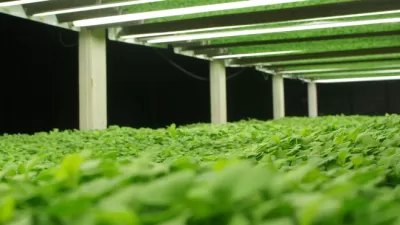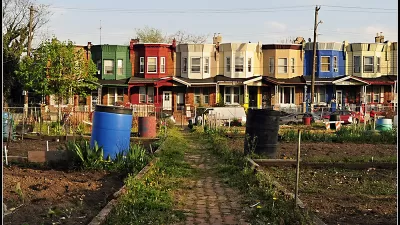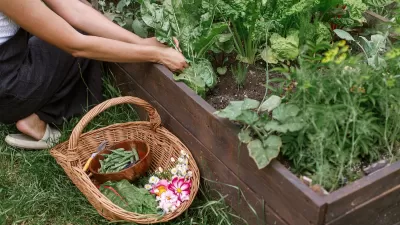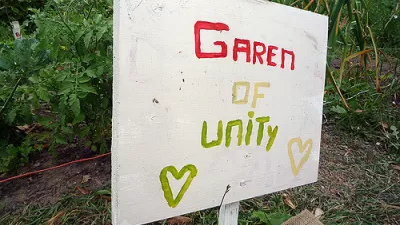Urban agriculture likely has more social than material impacts. But who does it benefit most?

With the continued popularity of urban agriculture and community garden programs, Vox sets out to determine their true value. Specifically, writer Brad Plumer asks, "Are there real social or environmental benefits to growing food within city limits? Or is urban farming just a well-meaning but ultimately insignificant hobby for urban elites?"
Plumer explores a May study from the Johns Hopkins Center for a Livable Future that found, in so many words, that "the actual food grown in community gardens and urban farms nowadays is their least important contribution."
Undeniably, many people in American cities cannot easily access healthy or fresh food. But today, that’s a failure of distribution, rather than of production. "We're not suffering from a dearth of cropland," Plumer writes.
Rather, in some cities, urban agriculture has been found to increase social bonds and provide a forum for science education, civic engagement, youth development, and workforce training.
Still, even these social impacts can cut both ways, depending on how, where, and by whom the programs are administered. "Urban farms aren't always as inclusive as they aspire to be—and there are often huge class divides," Plumer writes.
A number of case studies have found that urban farms and gardens — both for-profit and non-profit — have been led by mostly white non-residents in predominantly black and/or Latino neighborhoods, unintentionally excluding people of color from participating in or reaping the benefit of such efforts.
Moreover, Plumer adds that "when a community garden is established in a neighborhood, property values typically shoot up in the surrounding area. This can also raise thorny issues around gentrification and displacement in low-income areas."
And the study found that when urban ag initiatives are led by low-income communities and communities of color, they are often stymied from realizing their full potential by "disparities in access to land, government funding, and political support compared to urban agriculture efforts led by white and middle-class groups."
FULL STORY: The real value of urban farming. (Hint: It's not always the food.)

Planetizen Federal Action Tracker
A weekly monitor of how Trump’s orders and actions are impacting planners and planning in America.

Congressman Proposes Bill to Rename DC Metro “Trump Train”
The Make Autorail Great Again Act would withhold federal funding to the system until the Washington Metropolitan Area Transit Authority (WMATA), rebrands as the Washington Metropolitan Authority for Greater Access (WMAGA).

The Simple Legislative Tool Transforming Vacant Downtowns
In California, Michigan and Georgia, an easy win is bringing dollars — and delight — back to city centers.

The States Losing Rural Delivery Rooms at an Alarming Pace
In some states, as few as 9% of rural hospitals still deliver babies. As a result, rising pre-term births, no adequate pre-term care and "harrowing" close calls are a growing reality.

The Small South Asian Republic Going all in on EVs
Thanks to one simple policy change less than five years ago, 65% of new cars in this Himalayan country are now electric.

DC Backpedals on Bike Lane Protection, Swaps Barriers for Paint
Citing aesthetic concerns, the city is removing the concrete barriers and flexposts that once separated Arizona Avenue cyclists from motor vehicles.
Urban Design for Planners 1: Software Tools
This six-course series explores essential urban design concepts using open source software and equips planners with the tools they need to participate fully in the urban design process.
Planning for Universal Design
Learn the tools for implementing Universal Design in planning regulations.
Smith Gee Studio
City of Charlotte
City of Camden Redevelopment Agency
City of Astoria
Transportation Research & Education Center (TREC) at Portland State University
US High Speed Rail Association
City of Camden Redevelopment Agency
Municipality of Princeton (NJ)





























